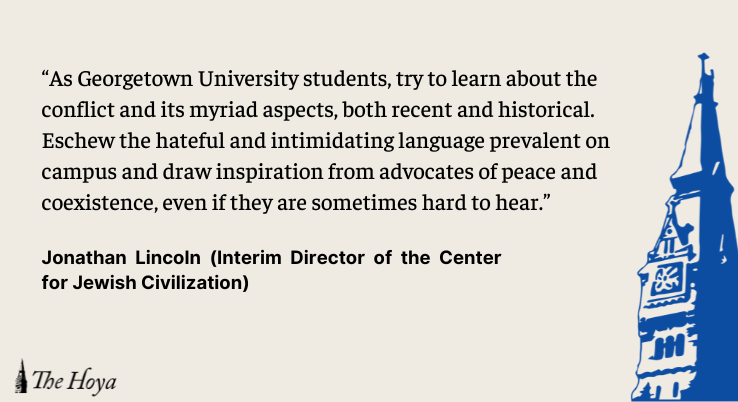From 2005 to 2009 and again from 2017 to 2021, I served as a United Nations (U.N.) official based in Israel, the West Bank and the Gaza Strip.
I arrived during Israel’s withdrawal from Gaza in 2005 and worked on post-conflict arrangements following the 2006 war between Israel and Hezbollah. I supported U.N. de-escalation efforts following multiple exchanges between Israel and Hamas, including the conflict in May 2021, and led a team that helped facilitate international assistance to Gaza and the West Bank.
It is clear that this long-standing conflict, one that I know very well, has now entered into an entirely new stage that leaves us with far more questions than answers. But to better understand the implications of the war, where it might lead and how this conflict might one day be resolved, it is critical to examine the historical and political backdrop. Below are some thoughts that might help the Georgetown University community think through the implications of this terrible war.
First, the overwhelming brutality displayed by Hamas on Oct.7 — the killing and kidnapping of Israeli civilians, including babies, children and entire families — has deeply traumatized Israel and much of the Jewish world.
For many, this act of terrorism — the largest in the country’s history — and Israel’s failure to prevent it has invoked the darkest periods of Jewish history. That this happened amid a surge in global antisemitism has increased the sense of fear in many Jewish communities.
Second, as Israel aims to inflict the maximum damage on Hamas, whether its war aims match what is possible remains a question.
Moreover, the catastrophe unfolding for Palestinians in Gaza — between the deaths of thousands of civilians, the displacement of some 50% of the population and the rapidly deteriorating humanitarian conditions — raises serious concerns over the cost of Israel’s response. Increased humanitarian aid and any efforts toward the release of hostages could change this conflict’s deadly trajectory.
But with a ground invasion already underway and the growing risk of other state and nonstate actors entering the war, it is almost impossible to think about a “day-after” scenario. If anything positive is to emerge from the carnage, at a minimum, Israel’s approach to the Palestinians, its occupation of the West Bank and Gaza and the Palestinian approach to Israel will need to change dramatically.
Third, among the complicating factors is that this conflict began at a period of unprecedented political division in both Israel and Palestine.
Despite the massive civil and military mobilization in Israel, distrust toward the current government is high. The sense of failure regarding the massacre is only compounded by lingering resentment of Israeli Prime Minister Benjamin Netanyahu’s plan to overhaul the country’s judiciary earlier this year.
These policies weakened the military, slowed the economy, incited social divisions and prioritized an agenda toward the Palestinians forged by extremists. Not only has Netanyahu not taken responsibility for these issues, but some of his supporters seem to be casting blame far and wide across the security establishment for the failure to contain Hamas.
Despite bringing opposition members into a newly formed war cabinet, Netanyahu intends to continue as prime minister. If history offers any precedent, as happened in the aftermath of the 1973 war, a reckoning is likely to come, not just for Netanyahu, but for several of his ministers as well.
The failure of the decades long peace process between Israel and the Palestinian Liberation Organization, has left Palestinian politics in a state of suspended animation. The situation is worsened as Israeli settlements expand on the West Bank and Palestinian armed groups proliferate, alongside a significant spike in violence.
Furthermore, the Palestinian Authority’s (PA) credibility is at an all-time low, with a succession battle brewing to replace the 87-year-old President Mahmoud Abbas. In 2007, Hamas expelled the PA from Gaza in a bloody coup.
This political and administrative division between the territories, coupled with Hamas’ mismanagement of Gaza over the past 16 years, has greatly compounded the economic and humanitarian damage to the Strip caused by multiple wars and Israel’s and Egypt’s closure policies.
In addition, every war between Hamas and Israel in Gaza — including the current one — further highlights the near total irrelevance of the PA.
Fourth, Gaza is just one aspect of a wider political conflagration involving Israel, Iran, the West Bank, Syria, Hezbollah in Lebanon and others — all of which need to be considered both as the fighting continues and once it ends.
What the region will look like in the coming months or years is unclear. There is some hope that the recently formed relationships between Israel and several Arab countries might help in a post-conflict transition for Gaza, but that seems far off at the moment.
Lastly, it’s hard to be optimistic.
Despite it all, I am encouraged by many friends, colleagues and other voices in Israel, Palestine and beyond who continue to advocate and work toward a better, more dignified and peaceful future for both peoples.
Mutual respect and empathy are vital.
As Georgetown University students, try to learn about the conflict and its myriad aspects, both recent and historical. Eschew the hateful and intimidating language prevalent on campus and draw inspiration from advocates of peace and coexistence, even if they are sometimes hard to hear.
Jonathan Lincoln is the Interim Director of the Center for Jewish Civilization and a visiting professor.














